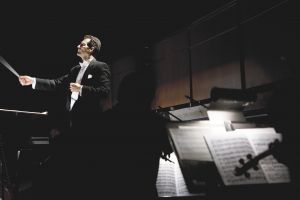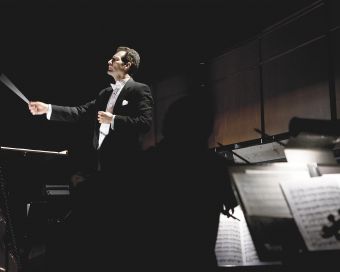Denver
When Lawrence Golan picks up his baton here at the University of Denver, the musicians in his student orchestra see a genial conductor who corrects their mistakes without raising his voice in frustration.
Yet Mr. Golan is frustrated, not with the musicians, but with a copyright law that does them harm. For 10 years, the music professor has been quietly waging a legal campaign to overturn the statute, which makes it impossibly expensive for smaller orchestras to play certain pieces of music.
Now the case is heading to the U.S. Supreme Court. The high-stakes copyright showdown affects far more than sheet music. The outcome will touch a broad swath of academe for years to come, dictating what materials scholars can use in books and courses without jumping through legal hoops. The law Mr. Golan is trying to overturn has also hobbled libraries' efforts to digitize and share books, films, and music.
The conductor's fight centers on the concept of the public domain, which scholars depend on for teaching and research. When a work enters the public domain, anyone can quote from it, copy it, share it, or republish it without seeking permission or paying royalties.
The dispute that led to Golan v. Holder dates to 1994, when Congress passed a law that moved vast amounts of material from the public domain back behind the firewall of copyright protection. For conductors like Mr. Golan, that step limited access to canonical 20th-century Russian pieces that had been freely played for years.
"It was a shocking change," Mr. Golan says over dinner at a tacos-and-margaritas dive near the University of Denver's mountain-framed campus. "You used to be able to buy Prokofiev, Shostakovich, Stravinsky. All of a sudden, on one day, you couldn't anymore."
Other works once available but now restricted include books by H.G. Wells, Virginia Woolf, and C.S. Lewis; films by Alfred Hitchcock, Federico Fellini, and Jean Renoir; and artwork by M.C. Escher and Pablo Picasso. The U.S. Copyright Office estimated that the works qualifying for copyright restoration "probably number in the millions."
Congress approved the recopyrighting, limited to foreign works, to align U.S. policy with an international copyright treaty. But the Golan plaintiffs—a group that includes educators, performers, and film archivists—argue that bigger principles are at stake. Does Congress have the constitutional right to remove works from the public domain? And if it does, what's stopping it from plucking out even more freely available works?
"If you can't rely on the status of something in the public domain today—that is, if you never know whether Congress is going to act again and yank it out—you're going to be a lot more cautious about doing anything with these materials," says Mr. Golan's lawyer, Anthony Falzone, executive director of the Fair Use Project and a lecturer in law at Stanford Law School. "You really destroy the value and the usefulness of the public domain in a profound way if the rug can be pulled out from under you at any time."
The Radicalization of Golan
Before the rug was yanked out from under him, Mr. Golan had no experience as an activist. He still doesn't seem like one. Outside the orchestra pit, the conductor could pass for an off-duty businessman: trim build, clean-cut dark hair, slacks, waist-length tan jacket. The tenured professor has taught conducting and led the 80-student Lamont Symphony Orchestra at this private university since 2001. Yet he has done little to publicize his cause on campus, at least judging from the reactions of others in the music school one recent evening as the halls buzzed with costumed nuns rehearsing Puccini's Suor Angelica.
"No!" said one professor after hearing that Mr. Golan's case was going to Washington. "Are you making it up?" asked another.
Mr. Golan keeps a low profile as a plaintiff because his life is about music, not litigation. "I would love to have my name go down in history like Arturo Toscanini, for being the greatest conductor of all time," he says.
But because his quest for that glory coincides with a broad shift in the reach of copyright law, he has a better shot at going down in history as the capitalized name atop a Supreme Court opinion studied by future generations of law students.
The son of a violinist in the Chicago Symphony Orchestra, Mr. Golan was just starting his own professional career when Congress passed the copyright restoration.
The change was surprising from a philosophical point of view: Under copyright law, the Constitution grants authors a limited monopoly over their works as an incentive to promote creativity. Over the years, Congress has often delayed the passage of works into the public domain by lengthening the duration of copyright terms. But removing pieces already there was different, Mr. Golan's lawyers argue, a radical change in what one scholar describes as the basic "physics" of the public domain.
That may sound abstract, but the impact on Mr. Golan was direct. When a work is in the public domain—that Puccini opera, say—an orchestra can buy the sheet music. Symphonies typically cost about $150. And the orchestra can keep those pages forever, preserving the instructions that librarians laboriously pencil into scores. But works under copyright are typically available only for rent. And the cost is significantly higher: about $600 for one performance. With the flip of a switch, the new law restored copyright to thousands of pieces.
For big-city orchestras like the New York Philharmonic, that change is like a "mosquito bite," Mr. Golan says. But Mr. Golan's university ensemble gets only about $4,000 to rent and buy music each year. That means it can perform some copyrighted works but must rely on the public domain for about 80 percent of its repertoire. And $4,000 is relatively generous. Other colleges might have only $500 to spend on music. When the Conductors Guild surveyed its 1,600 members, 70 percent of respondents said they were now priced out of performing pieces previously in the public domain.
Teaching suffers, too. Every year, for example, University of Denver students compete for the honor of playing a concerto, a piece in which the orchestra accompanies a solo instrument. But when a pianist wanted to audition with a piano concerto by Prokofiev, a Russian composer who died in 1953, Mr. Golan was forced to tell her no.
"It's one that any aspiring pianist needs to learn, and to have the experience of actually playing it with orchestra is phenomenal," Mr. Golan says. But "we just didn't have the money in the orchestra budget to pay the rental price."
The problem soon got worse. In 1998, after lobbying by entertainment groups like the Walt Disney Company, Congress passed another law, extending copyrights by 20 years. This Copyright Term Extension Act—mocked by critics as the Mickey Mouse Protection Act—meant that a work would not enter the public domain until up to 70 years after its creator's death.
That legal one-two punch made it hard for Mr. Golan to play both foreign and American works, like Gershwin's Rhapsody in Blue.
In response to those changes, reform-minded academics at top law schools fought back with multiple lawsuits challenging the constitutionality of the statutes. The conductor's tale made him an ideal poster child for their war to protect the public domain.
Reformers suffered a defeat in 2003, when the Supreme Court rejected an online book publisher's challenge of the 20-year extension. In that case, Eldred v. Ashcroft, the court found the change acceptable in part because it had not "altered the traditional contours of copyright protection."
Think of the Golan case as "Eldred, the Sequel." Only this time the question isn't whether Congress can delay works from entering the public domain. It's whether removing works already there is a "bright line" Congress can't cross.
'Fairly Horrible'
If that bright line dims, scholars and librarians will have problems. To understand why, consider the copyright confusion faced by Elizabeth Townsend-Gard.
Ms. Townsend-Gard is an associate professor at Tulane University Law School. As a graduate student in the 1990s, she studied history at the University of California at Los Angeles. Her dissertation was a biography of Vera Brittain, a British author known for her World War I autobiography, Testament of Youth. Ms. Townsend-Gard mined letters, diaries, photos, and other texts for her research. But she worried about getting permission to publish materials she needed, because Ms. Brittain's literary executor, too, was writing a biography of the author.
In 1996 the ground shifted under Ms. Townsend-Gard's feet. At the outset of her research, almost all the works she needed had been in the public domain. When she finished, because of the restoration now under attack by Mr. Golan, almost all those works were under copyright.
She ultimately diversified her project so that it became a comparative biography of many subjects rather than just one. But she also grew fascinated with the copyright complexities surrounding the daily work of historians. Ms. Townsend-Gard ended up going to law school after finishing her Ph.D., and invented a software tool, called the Durationator, designed to tell users the copyright status of any work.
The market of scholars who might need that tool is large. The law at stake in Golan alone potentially affects anyone studying works created or published by non-U.S. authors or publishers from 1923 to 1989. Most of those materials were in the public domain before. Now they are covered by a complicated copyright statute, says Ms. Townsend-Gard.
"For people who work on the 20th century, it's fairly horrible," she says.
Now pull back from the view of an individual scholar, and imagine you are working on one of the numerous projects to make millions of digital books available online. Libraries, archives, Google: Copyright restoration has big consequences for their digitization efforts. Most of those ventures will not publish the full texts of works online unless they are clearly in the public domain in the United States.
But when it comes to a foreign book, figuring out its copyright status can require a mammoth investigation. That's because a work must have been under copyright in its home country to qualify for restoration in the United States, says Kenneth D. Crews, director of the copyright advisory office at Columbia University Libraries. So, for example, when Columbia considers digitizing a rare trove of Chinese books, including many from the 1920s and 1930s of great interest to scholars, its staff must grasp the legal nuances of a country that has gone through a revolution—and a transformation of copyright law—since the books were published. Or must try to, anyway.
And if the law is unclear, the university must decide whether digitization is worth risking a potentially expensive lawsuit should a rights-holder turn up later.
"It's deterring digitization on anything foreign," Ms. Townsend-Gard says, "because people can't figure it out."
The U.S. Court of Appeals for the 10th Circuit took a different view. In a 2010 ruling backing the government, it stressed the argument that recopyrighting foreign works that had fallen into our public domain was crucial to protecting American authors' interests abroad. Our restoration of those copyrights could drive other countries to grant retroactive copyrights to contemporary American works that had fallen into their public domains.
And big money is at stake. The court quoted Congressional testimony from the mid-1990s in which a group representing publishers, record companies, and other copyright-based industries estimated that billions were being lost each year because foreign countries were failing to provide copyright protections to U.S.-originated works. The recording industry told lawmakers that there were "vastly more U.S. works currently unprotected in foreign markets than foreign ones here."
The government, in its Supreme Court brief, pointed out that the copyright restorations were limited in scope. They applied to foreign works whose creators weren't familiar with U.S. copyright procedures, for example. Other works restored were previously ineligible for protection.
The Supreme Court is expected to decide the case during the term that begins in October. Mr. Golan hopes to be in Washington to watch. Unless, that is, he has a concert to conduct.











Glad you liked it. Would you like to share?
Add a comment
Log in to post
with your Chronicle account:
Don't have an account? Create one now.
Or log in using one of these alternatives:
Showing 40 of 43 comments